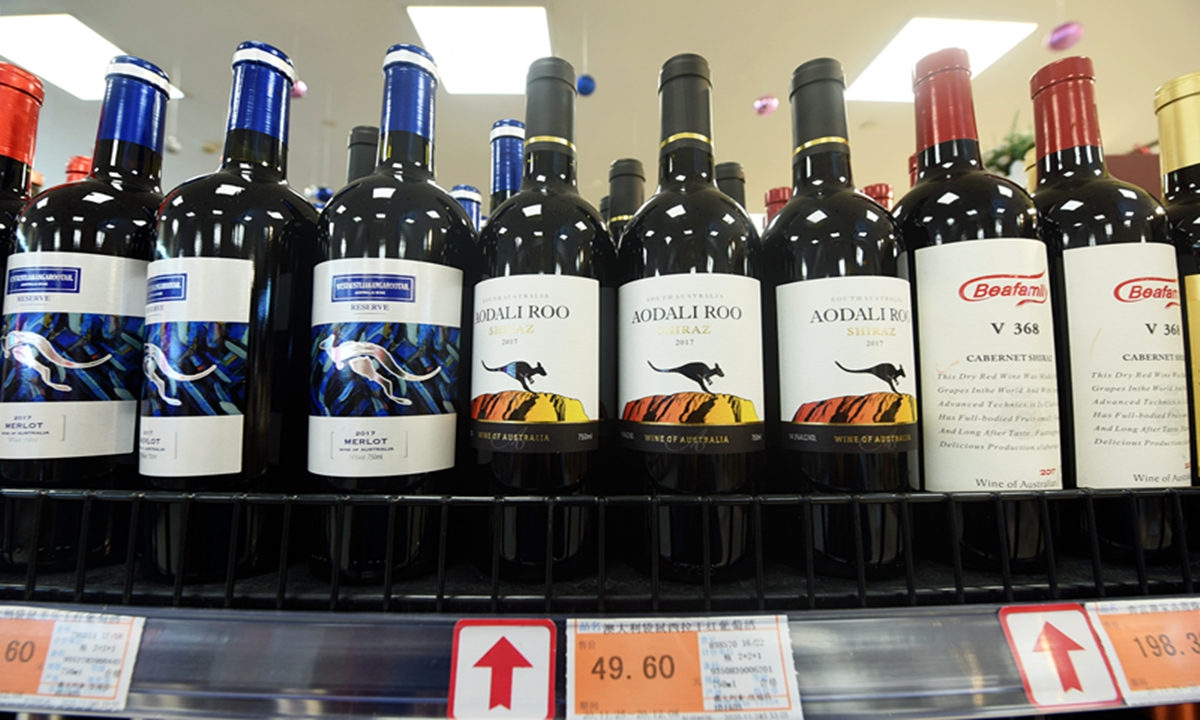Australian wine faces further duties as China imposes anti-subsidy and anti-dumping tariffs
By Wang Bozun Source: Global Times Published: 2020/12/10 16:23:26
New tariffs could deal 'destructive blow' to market share: importer

Bottles of Australian wine on the shelf of a supermarket in Hangzhou, East China's Zhejiang Province on November 27, 2020 Photo: VCG
China's new anti-subsidy tariffs and previously imposed anti-dumping tariffs could deal a destructive blow to Australian wines' future in the Chinese market and cause a glut in Australia, Chinese wine importers and industry experts said on Thursday.
The move is in line with laws and WTO rules, and it is not linked to deteriorating bilateral ties, experts also noted. However, they said, if bilateral ties were sound, there could be an easier way to deal with trade issue such as good-willed negotiations. Apparently, Australia did not offer to create such an atmosphere.
The comments came after the Ministry of Commerce (MOFCOM) announced on Thursday that China will impose temporary anti-subsidy duties on wine from Australia starting on Friday - nearly two weeks after China imposed anti-dumping tariffs on Australian wine.
In a statement, the MOFCOM said that after an investigation into imported Australian wine, it was concluded that Australian subsidies had caused substantial damage to China's domestic wine industry.
According to the statement, China will impose temporary anti-subsidy duties on wines originating from Australia in containers holding under two liters, but it did not say how long the measure will last.
Nearly two weeks ago, China imposed provisional anti-dumping measures in the form of deposits on wine imported from Australia, with deposits ranging from 107.1 to 212.1 percent.
The tariffs will likely deal a blow to Australian winemakers wishing to sell products in the world's second-largest economy, with prices set to triple, locking out price-sensitive consumers. Chinese consumers could instead choose French or Italian wines at the same price, Long Guanyu, the general manager of a wine importer based in Xiamen, Southeast China's Fujian Province, told the Global Times on Thursday.
"It will have a huge effect on my business, because after these tariffs, the price will be at least three times higher," Long said, adding that he is fortunate to have had an order cleared by customs prior to the tariffs, which came into effect on November 28.
Long, who has imported nearly 200,000 bottles of Australian wines this year, said that he was already looking at other sources, including Chile, as he expects demand for Australian wine to crater.
"Chinese customers chose Australian wines over those from other sources because they can get the same quality at a cheaper price. I expect that the volume of imported Australian wine will sharply decrease."
Such tariffs would also lead to a wine and grape glut in Australia if the market share drops, which is highly possible, Li Guoxiang, a researcher with the Rural Development Institute of the Chinese Academy of Social Sciences, told the Global Times on Thursday.
China is Australia's largest foreign wine market, purchasing nearly 40 percent of Australia's total wine exports, according to Wine Australia.
After the two countries signed a free trade agreement in 2015, the market share for Australian wines in China rose by 8.9 percent as of 2019. The value of China's imports of Australian wine increased from $520 million in 2016 to $1.17 billion in 2019.
Since May, China has taken several measures against Australian goods to protect its own interests, including anti-subsidy and dumping tariffs on barley, and the suspension of timber, beef and lamb imports from several Australian companies.
These actions were widely taken as China's retaliation against Australia amid the deteriorating bilateral ties, according to some Western media and Australian politicians. But Chinese experts agreed that these actions were not directly linked to any political considerations.
China is taking legitimate action based on the rule of law, and in line with WTO trade rules, Yu Lei, chief research fellow at the Research Center for Pacific Island Countries at Liaocheng University, told the Global Times on Thursday.
"As enterprises in several industries have suffered from the COVID-19 pandemic causing more intense competition, the government had to address these trade remedy probe requests, which could explain China's measure," Yu said.
However, even though there is no direct link between China's actions and the deteriorating relationship, sound bilateral ties could facilitate solving trade disputes, Li said.
"There are many ways to solve trade issues such as talks, negotiations or legal action, and normally, if bilateral ties are sound, trade disputes could be solved in a more amenable way," Li said.
Australia's unfriendly moves against China's interests, including disputing China's sovereignty in the South China Sea, shows Canberra was intent on creating an unwelcoming atmosphere for better relations, Li said.
Newspaper headline: Australian wine faces further duties